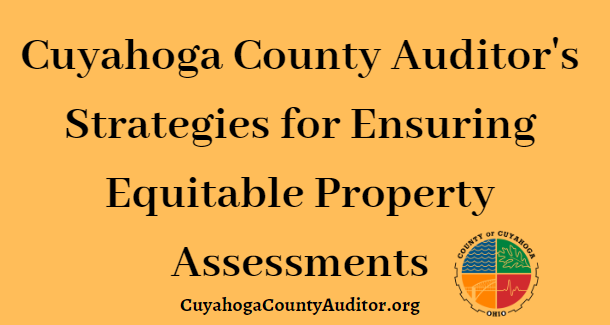n Cuyahoga County, Ohio, equitable property assessments are crucial for maintaining fairness and transparency in the real estate market. The county auditor plays a pivotal role in ensuring that property assessments accurately reflect market values and are conducted without bias.
Understanding County Auditor’s Role
The Cuyahoga County Auditor is responsible for overseeing property assessments within the county. This involves determining the value of residential, commercial, and industrial properties for taxation purposes. The auditor’s office employs various strategies to ensure that assessments are fair and equitable.
Strategies for Ensuring Equitable Property Assessments
Data-driven Assessment Methods
One of the primary strategies employed by the Cuyahoga County Auditor is the use of data-driven assessment methods. By analyzing market trends, property sales data, and other relevant information, the auditor’s office can determine accurate property values.
Regular Property Reassessments
To maintain accuracy and fairness, the auditor’s office conducts regular reassessments of properties throughout the county. This ensures that property values are updated to reflect changes in market conditions and property improvements.
Fair and Transparent Assessment Processes
Transparency is key to ensuring equitable property assessments. The auditor’s office strives to maintain open communication with property owners and provide clear explanations of the assessment process. Additionally, property owners have the opportunity to appeal their assessments if they believe they are inaccurate.
Community Engagement and Feedback Mechanisms
The auditor’s office actively engages with the community to gather feedback and address concerns related to property assessments. By soliciting input from residents and stakeholders, the office can identify areas for improvement and make adjustments to the assessment process as needed.
Challenges Faced by the Auditor
Limited Resources
One of the main challenges faced by the Cuyahoga County Auditor is limited resources. Conducting property assessments requires significant manpower and technological infrastructure, and budget constraints can impact the office’s ability to carry out its duties effectively.
Complexities of Property Valuation
Property valuation is a complex process that involves numerous factors, including market trends, property condition, and location. Assessors must navigate these complexities to arrive at accurate valuations, which can be challenging in a diverse and dynamic real estate market.
Impact of Equitable Property Assessments
Social Equity
Equitable property assessments promote social equity by ensuring that property taxes are distributed fairly among residents. By accurately valuing properties, the auditor’s office helps prevent disparities in tax burdens based on income or demographics.
Economic Implications
Fair and transparent property assessments are essential for maintaining a stable and thriving real estate market. When property values accurately reflect market conditions, buyers and sellers can make informed decisions, leading to greater confidence and investment in the local economy.
Conclusion
The Cuyahoga County Auditor employs various strategies to ensure equitable property assessments, including data-driven methods, regular reassessments, and transparent processes. Despite challenges such as limited resources and complexities of property valuation, the auditor’s office remains committed to upholding fairness and accuracy in property assessments for the benefit of the community.
